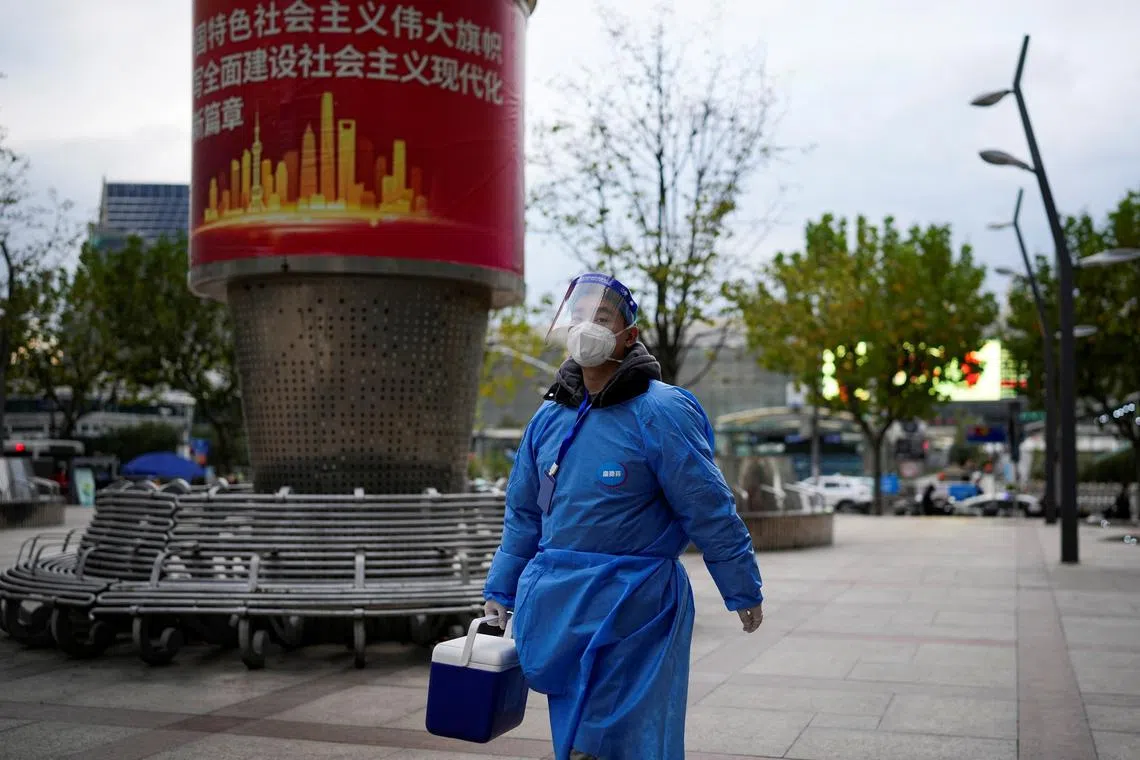More Chinese cities move to gradual opening, but uneven virus measures cause confusion, anger
Sign up now: Get insights on Asia's fast-moving developments

Restrictions on the purchase of over-the-counter cold and fever medication have also been lifted in a few cities including Beijing.
PHOTO: REUTERS
BEIJING - Even as more cities begin to loosen the noose around Covid-19 controls, uneven implementation and a lack of transparency have led to confusion and frustration.
Beijing, Shanghai, Hangzhou, Shenzhen, Dalian, Wuhan, Urumqi, Kunming, Harbin, Shenyang, Nanning and Zhengzhou, and Jiangxi and Shandong province, have over the weekend or on Monday lifted certain levels of restrictions, especially over once-strict testing mandates.
Most places no longer require a 48-hour negative test result to take public transport or to enter public venues. Curbs on the purchase of over-the-counter cold and fever medication have also been lifted in a few cities including Beijing.
The Covid-19 easing came after protests rocked more than a dozen cities last week, a deadly fire killed at least 10 people,
Demonstrations quickly spilled over to other cities – from Shanghai, Wuhan and Guangzhou to Zhengzhou, Hangzhou and Beijing – in the biggest display of public anger in decades, with scores of protesters arrested or called in for questioning.
In Beijing, while the authorities announced that they were scrapping test requirements for public transportation, much of the specifics of other Covid-19 relaxations are left to individual districts to administer under broad guidelines.
The lack of clarity has brought on some anxiety and much uncertainty, as residents are unsure if they will be taken away if they are infected or allowed to isolate at home, which has been the case in certain communities.
While some shops and restaurants have been allowed to open,
Last Friday, the authorities also suddenly ordered large numbers of testing booths to shut, resulting in confusion and anger as people waited for more than an hour in sub-zero temperatures at testing stations that are still operating.
Many took their frustration to social media, complaining of the long wait and delays in receiving their test results, which they need to take a taxi or go to work. “I don’t know how civil servants think. How are they carrying out the mantra, ‘To serve the people’?” said one netizen on microblogging site Weibo.
The wave of anger prompted the authorities to quickly reopen testing stations and issue a list of where they are.
“The problem is the policy from the top and the measures that come below are not always consistent. And the lower down the grassroots you go, the stricter the measures,” said Beijing resident Tu Jun, 43.
His income as an insurance agent has been severely hit by the lockdowns, since he is unable to meet potential and existing clients face to face, he said. He has also not been able to travel home to Wuhan for the past three years to see his parents during Chinese New Year.
“We are doing the right thing by relaxing Covid-19 measures because the virus has become so weak. The most important thing now is to refine the regulations and ensure there is unified implementation. Give the common people a way to clearly interpret the policy, and not make them have to guess.”
There are expectations that the health authorities may soon downgrade Covid-19 to a category of less serious infectious diseases, which reduces the remit of the authorities to order people into quarantine and put areas under lockdown.
Infections have trended down nationwide in the past days, with just over 30,000 cases reported on Sunday, after peaking at 40,000 in late November. But the number of cases has also dropped because of the dismantling of mass testing in some cities.
China stocks rallied on Monday, buoyed by news of Covid-19 easing, but pockets of protests have continued.
In Wuhan University in Hubei province, hundreds of students demonstrated in the rain on Sunday night



